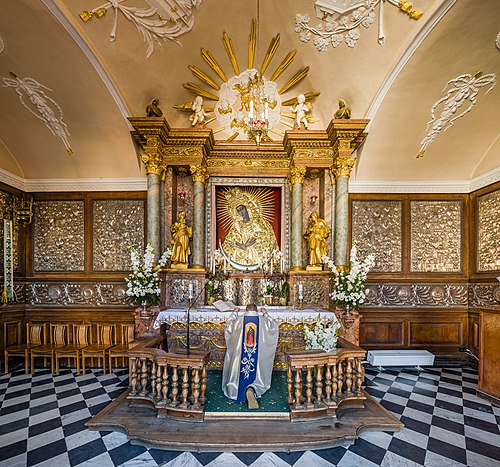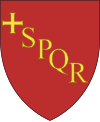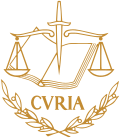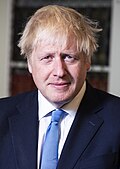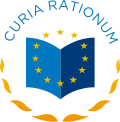Portal:European Union
Introduction
The European Union (EU) is a supranational political and economic union of 27 member states that are located primarily in Europe. The Union has a total area of 4,233,255 km2 (1,634,469 sq mi) and an estimated total population of over 449 million. The EU is often described as a sui generis political entity combining the characteristics of both a federation and a confederation. Containing 5.5% of the world population in 2023, EU member states generated a nominal gross domestic product (GDP) of around €17.935 trillion in 2024, constituting approximately one sixth of global nominal GDP. Its cornerstone, the Customs Union, paved the way to establishing an internal single market based on standardised legal framework and legislation that applies in all member states in those matters, and only those matters, where the states have agreed to act as one. EU policies aim to ensure the free movement of people, goods, services and capital within the internal market; enact legislation in justice and home affairs; and maintain common policies on trade, agriculture, fisheries and regional development. Passport controls have been abolished for travel within the Schengen Area. The eurozone is a group composed of the 20 EU member states that have fully implemented the economic and monetary union and use the euro currency. Through the Common Foreign and Security Policy, the union has developed a role in external relations and defence. It maintains permanent diplomatic missions throughout the world and represents itself at the United Nations, the World Trade Organization, the G7 and the G20. Due to its global influence, the European Union has been described by some scholars as an emerging superpower. In 2012, the EU was awarded the Nobel Peace Prize. The United Kingdom became the only member state to leave the EU, in 2020; ten countries are aspiring or negotiating to join it. (Full article...) Selected article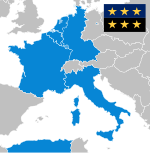 The ECSC was first proposed by French foreign minister Robert Schuman on 9 May 1950 as a way to prevent further war between France and Germany. He declared his aim was to 'make war not only unthinkable but materially impossible.' The means to do so, Europe's first supranational Community, was formally established in 1951 by the Treaty of Paris, signed not only by France and West Germany, but also by Italy and the three Benelux states: Belgium, Luxembourg and the Netherlands. Between these states the ECSC would create a common market for coal and steel. The ECSC was governed by a 'High Authority', checked by bodies representing governments, MPs and an independent judiciary. The ECSC was joined by two other similar communities in 1957, with whom it shared its membership and some institutions. In 1969 all its institutions were merged with that of the European Economic Community (EEC, which later became part of the European Union), but it retained its own independent identity. However in 2002 the Treaty of Paris expired, and with no desire to renew the treaty, all the ECSC activities and resources were absorbed by the European Community. During its existence, the ECSC had succeeded in creating a common market but could not prevent the decline of the coal and steel industries. It did however set the ground for the future European Union. Selected picturePhotograph: David Iliff The Chapel of the Gate of Dawn is a Catholic chapel and pilgrimage site on the city gates of the Lithuanian city of Vilnius. It is home to Our Lady of the Gate of Dawn, a painting of the Blessed Virgin Mary in the Northern Renaissance style. In this image, the painting is covered in expensive and elaborate silver and gold clothes, leaving only the face and hands visible.
Legend tells that in 1702, when Vilnius was captured by the Swedish army during the Great Northern War, Our Lady of the Gate of Dawn rescued the city: at dawn, the heavy iron city gates of the gate fell, killing four Swedish soldiers and promoting a successful Lithuanian counter-attack near the gate.
Did you know?... that the presidency of the EU Council rotates every half year? ... that the EU parliamentary election is the world's biggest transnational election? ... that the European Union was awarded the Nobel Peace Prize in 2012? Selected cityRome is the capital of Italy and of its region, called Lazio. It is located across the confluence of the Tiber and Aniene rivers. It was once the capital of the Roman Empire, the most powerful, largest and longest lasting empire of classical Western civilization. The Vatican, a sovereign enclave within Rome, is the seat of the Roman Catholic Church and the home of the Pope. Rome is the largest comune in Italy and it is also one of the largest European capital cities in land area, with an area of 1,285 square kilometers. Within the city limits, the population is about 2.5 million; almost 3.8 million live in the urbanised area of Rome, as represented by the province of Rome, making it second in population to Milan. With a gross domestic product of €97 billion in the year 2005, Rome produced 6.7% of Italy's GDP. General imagesThe following are images from various European Union-related articles on Wikipedia.
TopicsFeatured contentFeatured articles
Featured lists
Featured contentGood articles
CategoriesRelated portalsAssociated WikimediaThe following Wikimedia Foundation sister projects provide more on this subject:
Discover Wikipedia using portals |




